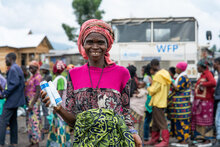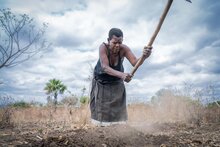Mali: WFP Opens Up New Routes To Reach More Conflict-Affected People In North
The first trucks delivered 200 metric tons of food to the town of Menaka, in the Gao region, and more convoys are on the way. In the coming days, this assistance will be distributed to 24,000 food-insecure people, in partnership with ACTED, a non-governmental organisation (NGO). WFP plans to use this route from Niger for further food deliveries to various locations in the regions of Gao and Kidal.
Over the past two weeks, WFP has delivered almost 2,000 metric tons of food assistance to 100,000 conflict-affected people in northern Mali, mainly in the Timbuktu region, using a combination of river and road transport. This assistance was distributed in cooperation with Handicap International, Solidarités International and CARE. Some 80,000 internally displaced persons (IDPs) and their hosts were also assisted in the south of the country -- in the regions of Mopti, Ségou, Koulikoro, Kayes and in Bamako -- in partnership with CARE, ACTED and ADR (Association d’appui aux actions de développement rural).
“We are actively expanding our logistics capacity to overcome access challenges in northern Mali,” said Zlatan Milisic, WFP Country Director in Mali. “Our next priority is to send more food to Kidal, hopefully in the next few days. And if we cannot reach certain areas by road or river, we will be ready to launch an air operation.”
WFP is concerned that some areas in need of food assistance are not readily accessible, due to the volatile security situation and the risks of landmines and attacks. More worrying, the flow of imported commercial goods into northern Mali has been almost interrupted and as a result the economy has almost come to a standstill; markets are closed or barely functioning, prices are soaring and people are using up their remaining stocks. All this contributes to the threat of a looming food and nutrition crisis.
WFP expects the volume of its humanitarian assistance in northern Mali to increase in the coming weeks, with the gradual reopening of more land routes. “This process is very slow, however, and we are worried that food is being consumed faster than it can be replaced, because of the serious lack of domestic trade and commercial imports,” added Milisic. Over a third of the population in northern Mali was dependent on food assistance even before the military intervention.
Under an emergency operation, WFP plans to provide food and nutrition assistance in 2013 to more than half a million people in Mali. This includes more than 400,000 crisis-affected people in the north and some 130,000 IDPs and host families in the south. Emergency activities include food and cash distributions; programmes to prevent and treat malnutrition in children, pregnant women and nursing mothers -- and emergency school meals.
WFP coordinates logistics and emergency telecommunication for the whole humanitarian community in Mali. WFP also runs the UN Humanitarian Air Service (UNHAS), which provides air transport for humanitarian workers, and plans to reinforce the service.
During last year’s drought, WFP supported more than 1 million people in Mali, as well as some 135,000 IDPs, 214,000 non-displaced people in the north and around 145,000 refugees in Burkina Faso, Mauritania and Niger.
WFP works with 15 partners for the emergency response in Mali -- CARE, Africare, Handicap International, Islamic Relief, Solidarités International, Action contre la Faim, OXFAM, Norwegian Church Aid, Médecins du Monde, ACTED, CSPEEDA, ADR, REACH, World Vision and AMRAD.
____________________________________
WFP is the world's largest humanitarian agency fighting hunger worldwide. Each year, on average, WFP feeds more than 90 million people in more than 70 countries.
Follow us on Twitter @wfp_media
For more information please contact (email address: firstname.lastname@wfp.org):
Zlatan Milisic, WFP/Bamako, Tel. + 223 20 79 20 45
Daouda Guirou, WFP/Bamako, Tel. + 223 20 79 20 45
Malek Triki, WFP/Dakar, Tel. +221 33 849 6500


